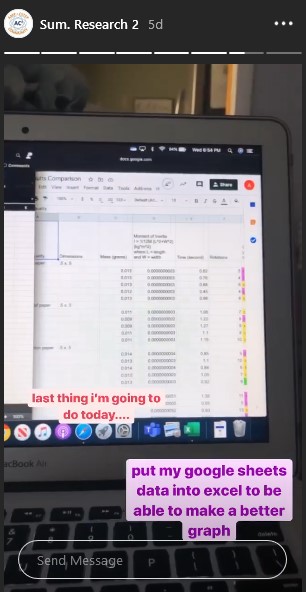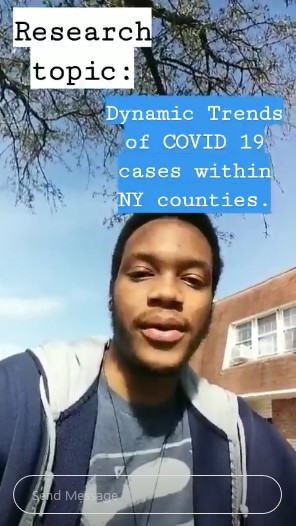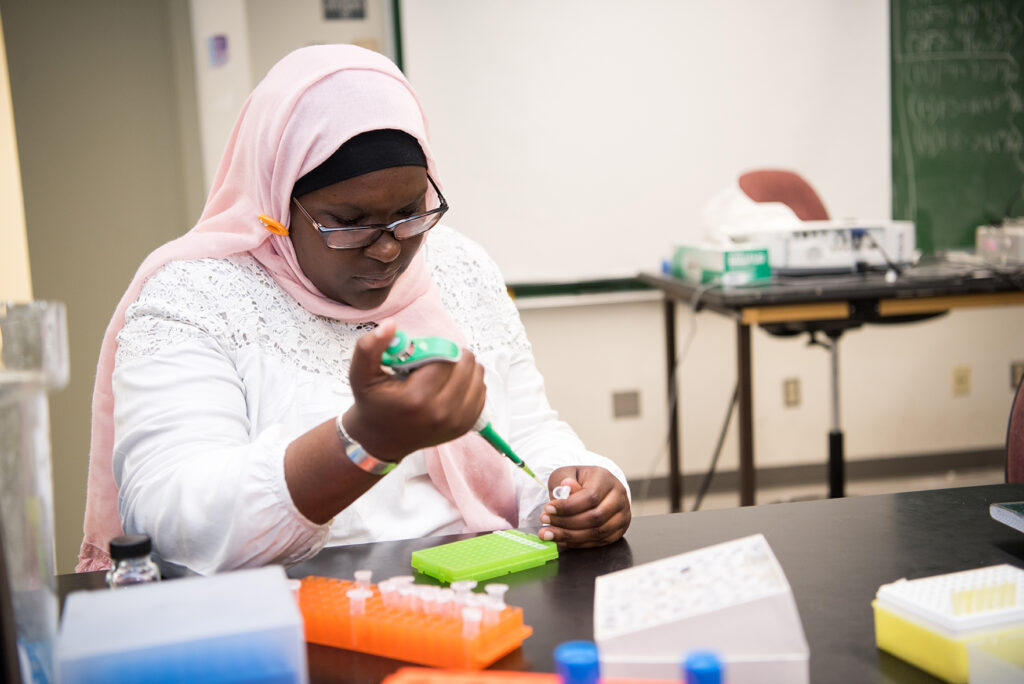The SUNY New Paltz campus has been quieter than usual this summer, but scholars across the disciplines are still hard at work, continuing their learning and contributing to their fields under unprecedented circumstances.
The AC² (AMP & CSTEP Community) Program, which supports underrepresented students working toward careers in STEM fields, provides an example of the campus community’s perseverance.
The program reconfigured its annual summer research experience for undergraduate students in STEM, enabling them to produce original scholarship while respecting social distancing guidelines.
Their work will culminate on Tuesday, June 30, at 10 a.m., with a series of presentations and audience Q&A delivered via Webex broadcast. All are welcome to tune in to the AC² summer research presentations. Click here to register to join the live event.
How Can We Make “Remote Research” Work?
As a member of the AC² Program, Kaitlyn Gonzalez ’21 (Biology) had been looking forward to adding a mentored research experience to her CV this summer.
“I expected that I was going to be in the lab from 10 to 5, just working along with my team,” Gonzalez said.
 The COVID-19 pandemic threw those plans into uncertainty. How could a summer research program provide meaningful experiences, at a time when students and faculty are unable to work together in the same spaces?
The COVID-19 pandemic threw those plans into uncertainty. How could a summer research program provide meaningful experiences, at a time when students and faculty are unable to work together in the same spaces?
“During spring break, I connected with professors who participate in the summer program to get their thoughts about whether we should move forward,” said Nancy Campos, director of the AC² Program. “We were all on the same page that this is a very important part of AC² and we wanted to make sure we still provided this experience for students.”
Campos coordinated an effort to offer faculty-led projects that could be conducted remotely. Rather than working in campus labs, most students are conducting their work from home, developing new skills in data management, analysis and independent study.
“The students being willing to work in a summer like this, it’s special – instead of going on vacation, they’re choosing to study. So, we have to give them some space to do so,” said Rachmadian “Doni” Wulandana, assistant professor in the Division of Engineering Programs.
Throughout the planning stages, the focus was on producing a meaningful experience that would provide real educational benefits.
“I believe there’s always something to do, something to be enthusiastic about in research,” Wulandana said. “We always go back to learning outcomes, thinking about what students will get out of doing this work. The novelty of the research may vary, but the steps of doing research – reading the papers, doing experiments, getting and analyzing data – can be done no matter what kind of project you’re working on.”
Studying a Pandemic in Real-Time

Among the unexpected perks of doing research during the COVID-19 era is that current events offer rich and relatively unexplored areas of study.

Jonathan Linton is a biology major at SUNY Orange participating in the AC² summer program through the College’s partnerships with regional community colleges. He joined Gonzalez and Shelah Ballard ’23 (Biology) on a team examining the correlation between mobility – how much people are traveling, and by what means – and spread of coronavirus in New York State.
“When I saw the invitation to work on a project related to COVID I was surprised, but I was really excited to do it,” Linton said. “Since this is currently happening, I knew it would be interesting research.”
The project requires gathering, organizing and analyzing publicly available data. That posed new challenges for Linton, Gonzalez and Ballard, who are all studying biology. The mentorship provided by Anca Radulescu, assistant professor of mathematics, has proven indispensable.
“There are really tough limitations to a project like this, where the data is new and it’s not mathematically clear what is needed,” Radulescu said. “A lot of what they’ve been doing is checking if the data is there, checking what the data actually tells us, and then trying to patch it together.”
The team has succeeded in drawing meaningful knowledge from the study, helping to confirm emerging evidence about how coronavirus is transmitted.
“We found that most of the infections in the city have been coming from people who were at home,” Linton said. “Many of the hospitalizations have been of people who were inside the home, isolating and following the policies and laws.”
None of the students on this team had been planning on a career in data analysis – Gonzalez is looking at becoming an oncologist, Linton a veterinarian, and Ballard an orthopedist – but all said that the experience working with large sets of complex figures would be an asset going forward.
“Data analysis isn’t something we would normally do in our biology classes, but it’s definitely going to be helpful,” Gonzalez said. “It can get intense looking at infection rates and hospitalizations. But it also feels like I’m doing something that’s really meaningful. It’s just further motivation to continue working on this as best as I possibly can.”
Remote, but Still Family

It’s taken hard work by students and faculty, but the AC² summer research program is delivering on its mission to provide valuable experiences to underrepresented students in STEM fields.
“The process has been challenging, but in the end it’s made me a better researcher in a lot of different aspects,” said Enrique Contreras-Nava, a SUNY Orange biology major working on Wulandana’s team. “I’m planning to transfer to SUNY New Paltz in the spring, so I’m trying to do as much as I can to get experience and build up my portfolio and skills.”
That emphasis on putting students’ needs first is no surprise to those who have been involved with AC² for many years.
“I want to emphasize how different AC² is from other research and grant programs,” Radulescu said. “This is specifically student-oriented, rather than being project-oriented, which impresses me every single time. It’s all about giving students what they need for their futures. Other programs just don’t have that same focus, which is part of what makes it feel like a family.”
The word “family” comes up again and again when people talk about AC². Many students say the program offers a space where they feel comfortable letting their guards down and just being themselves.
“I honestly really love it,” Ballard said. “Not many other schools have a program like this especially for underrepresented people. It has been nice to go somewhere that you can talk to people who look like you, like having a family away from home.”
“I’m not even a SUNY New Paltz student, and this is my first time doing research with AC²,” Linton added. “I was nervous at first, but when I first met with Kaitlyn, Dr. Anca and Shelah, I already felt welcomed, like this was already a team.”
Visit the AC2 program at SUNY New Paltz online to learn more, and use this link to join the live summer research presentation event on Webex, June 30 at 10 a.m.

